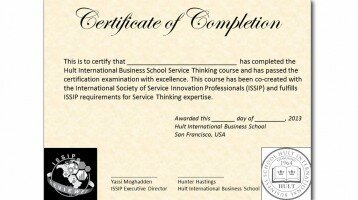Abstract
Business paradigm shifts are rare. However, the shift to a service-dominant economy and to service-dominant value creation genuinely merits such a designation, both on the surface through the lens of traditional economic measures and even more deeply and profoundly through the lens of Vargo and Lusch’s Service-Dominant Logic (S-D Logic). Almost 80% of GDP in developed economies is attributable to services, and some economists regard products as merely the physical embodiment of service delivery. Yet today’s business analysis, business management, business organization, business processes, and business education emerged from a manufacturing- dominant logic; the principles of service are often underserved and poorly understood. This results in lost opportunities for growth.
Service Science, Management and Engineering (SSME) has been slowly bubbling up and building learning and knowledge in academia for 30 years, with an acceleration in the last 10 years. The disciplines, principles, insights and tools of SSME are now ready to transition to the mainstream business world, with transformative effect.
This book begins with expository case histories of the SSME-based transformation of familiar businesses. It then expounds the seven principles of service science, with compelling examples and clear direction for application. It describes the tools for application of the principles, from modular business architecture (a new form of business organization to achieve absolute advantage) to the Glo-Mo-So (global, mobile, and social) business tools that establish scalable platforms for fast, efficient growth in the service economy for Globally Integrated Enterprises—large and small/medium enterprises (SME).
The first principle—from which all else logically follows—is that value is co-created. “Value co-creation” changes all roles: the role of the customer vis-a-vis the provider, the role of the employee vis-a-vis the hierarchy, the role of the specialist company vis-a-vis the giant corporation. S-D Logic Fundamental Proposition (FP) 10 states that value is uniquely and phenomenologically determined by the beneficiary. FP 7 states that the enterprise cannot deliver value, but only offer value propositions.
Value co-creation is the force behind the rise of social business tools. The “social approach” (to business, to branding, to innovation, etc.) emphasizes winning by “fitting in” and “contributing”, and to do so well requires new ways of analyzing trends in society, business, and industry architecture. This is as true for the individual as it is for the enterprise. Service science emphasizes the T-shape, combining both specialized depth (the vertical in the T) and breadth of comprehension and understanding (the horizontal in the T). Both are required for success—for enterprises and individuals.
Social business tools are reflective of service systems, assembled from knowledge, technology, and value propositions to create perfected service outcomes and experiences. Modularized business architectures are the route to optimizing participation in service systems, and Component Business Model (CBM) is one specific tool to design such as architecture.
Social business tools generate “big data,” requiring new methods and ways of incorporating analytics, including predictive modeling. Learning is always dynamic in social science, adhering to the principle of Run-Transform-Innovate for continuous improvement.
Service science, as a field of academic study and research, is supported by 30 years of learning. This book brings this knowledge firmly into the business mainstream, addressing both the “Why” and the “How,” and incorporating the tools for action.
Contents
About the Authors
Hunter Hastings and Jeff Saperstein
Hunter Hastings has occupied the posts of Chief Marketing Officer in a global consumer products business, Chief Executive Officer in a Silicon Valley start-up enterprise, and Senior Partner in a global consulting company. He is currently serving as adjunct faculty at Hult International Business School, the largest global graduate business school.
Jeff Saperstein is an author, teacher, consultant, and enabler in how technology can be used to create growth in regional economic development and success for organizations, and personal career planning. He has co-authored eight books, three case studies, and numerous business journal articles.
Review by Professor Alan Barrell
For the business practitioner, there is a lot to grab here to get the grey cells racing. The book will give you lots of ideas about how to transform and evolve as a surviving species. Highly recommended.
Book Order Page
Buy the book in print or on Kindle.
